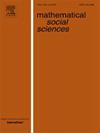Rawlsian Matching
IF 0.7
4区 经济学
Q4 ECONOMICS
引用次数: 0
Abstract
We apply the Rawlsian principle to a canonical discrete object allocation problem. A matching is Rawlsian if it is impossible to improve the ranking of assignment for the worst-off agent or reduce the cardinality of the set of the worst-off agent-body. None of the well-known mechanisms are Rawlsian. We introduce an efficient and Rawlsian class of mechanisms. Strategy-proofness is incompatible with Rawlsianism; therefore, no Rawlsian mechanism is strategy-proof.
罗尔斯匹配
我们将罗尔斯原理应用于典型的离散对象分配问题。如果不可能提高最差代理人的分配排名或减少最差代理人-主体集合的卡入度,那么匹配就是罗尔斯式的。众所周知的机制都不是 Rawls 式的。我们介绍一类高效的罗尔斯机制。策略证明与罗尔斯主义是不相容的;因此,没有一种罗尔斯机制是策略证明的。
本文章由计算机程序翻译,如有差异,请以英文原文为准。
求助全文
约1分钟内获得全文
求助全文
来源期刊

Mathematical Social Sciences
数学-数学跨学科应用
CiteScore
1.30
自引率
0.00%
发文量
55
审稿时长
59 days
期刊介绍:
The international, interdisciplinary journal Mathematical Social Sciences publishes original research articles, survey papers, short notes and book reviews. The journal emphasizes the unity of mathematical modelling in economics, psychology, political sciences, sociology and other social sciences.
Topics of particular interest include the fundamental aspects of choice, information, and preferences (decision science) and of interaction (game theory and economic theory), the measurement of utility, welfare and inequality, the formal theories of justice and implementation, voting rules, cooperative games, fair division, cost allocation, bargaining, matching, social networks, and evolutionary and other dynamics models.
Papers published by the journal are mathematically rigorous but no bounds, from above or from below, limits their technical level. All mathematical techniques may be used. The articles should be self-contained and readable by social scientists trained in mathematics.
 求助内容:
求助内容: 应助结果提醒方式:
应助结果提醒方式:


